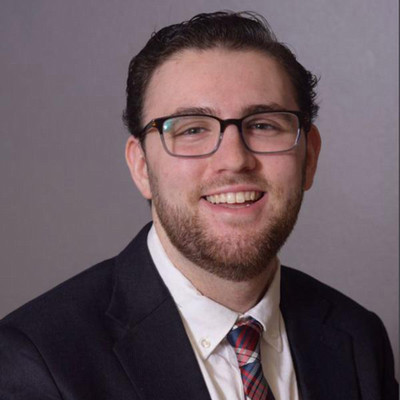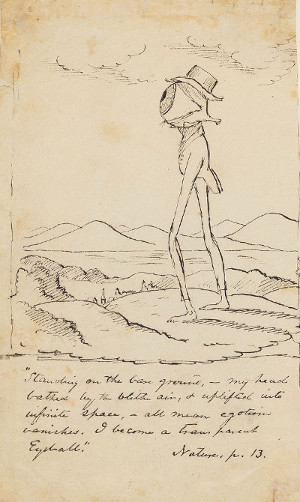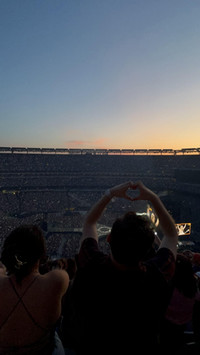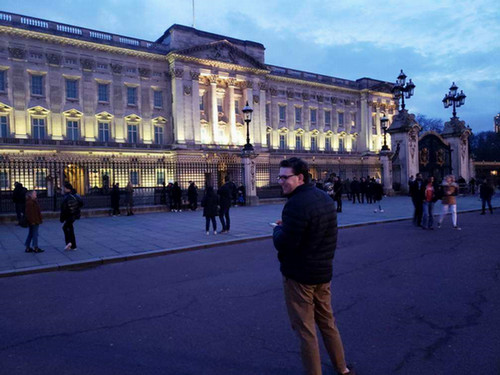
A conversation with Eddie O'Brien, English alumni
What is your current job/title?
Assistant Director of Stewardship and Donor Relations, Division of University Advancement at The Catholic University of America.
Why did you choose to study English at Catholic U.?
I was pretty determined that English was what I wanted to pursue for the rest of my life on my first day of sophomore year of high school. I had the most wonderful English teacher, Mrs. Von, who started our first class by reciting the opening lines of Beowulf, from memory, in Old English. For me, she embodies what it means to love what you do and spark the enthusiasm for it in others. I was blessed to have Mrs. Von during my senior year, too. During those years, she pushed me while always being my biggest supporter and inspiration. I would later learn from Dr. Okuma the importance and efficacy of constructive feedback - and this is exactly what Mrs. Von provided me with.

When I was looking into English programs at universities, I wanted to be educated by a faculty that was as enthusiastic and nurturing as Mrs. Von. I remember seeing a picture of Dr. Gibbons, wearing a straw hat, teaching a class on one of the University’s lawns and recognizing what that symbolized to me: a real community with a professor who brings their students’ learning into the world. The most memorable lessons with Mrs. Von were on transcendentalism, and I remember her sharing the image of the “Transparent Eyeball” when we were reading Emerson. Dr. Gibbons, textbook in hand, and the students sitting on the grass out in the open elided with the quirky pencil-sketch Mrs. Von had introduced to me, leading me to seek that philosophy of life in and with my soul.
Coming to Catholic University proved to be an avenue for my soul to find and explore what that quirky image inspired in me. I found this especially true because the University takes a humanistic approach to literature and encourages the intentional use of electives to complement interests that I could bring or connect to the readings I worked through and the topics I would write on. I ended up loving it so much that I chose to stay and pursue it further with the same faculty that I grew to admire and love.
What was your path from graduation to your current job like? What advice can you give senior majors and recent grads about life after graduation?
TALK IT OUT. Talk to your parents, talk to your professors, talk to your friends. Talk talk talk, and not just to yourself. You won’t always hear what you want to hear - and that’s exactly why you need to hear it. Others’ feedback will either give you the courage of your convictions or remove the wool from your eyes and show you that you’re either thinking too small and safe or that you really have no idea what you’re thinking.
I remember telling everyone that I wanted to be a teacher before coming to college and people would pat me on the head and tell me that was great. Reality hit when Dr. Gibbons advised against going into education because it is a hard field to survive in, before “getting off [his] soapbox” and reviewing my first-year spring semester course list. Dr. Okuma and Dr. Mack, and pretty much every other professor I was close with, blended the two responses for me: they think I’d be a great educator, but it would not be an easy career. NOT what I wanted to hear. But I kept talking.
My senior year was spent in my bedroom, during COVID’s shutdown of the world. I was doing my seminar with Dr. Gregory, reading the works of James Baldwin and Joan Didion. (Dr. Gregory, thank you for the best literary experience and exposure of my life thus far!) I was missing being in a classroom and feeling the community. I wanted my book club-esque seminars back that were not mediated by a screen. So I became committed to continuing straight through to my M.A. after undergrad. But…that didn’t work out how I wanted it to, either. Dr. Gregory, like Dr. Gibbons, was real with me. He told me the pandemic would have some difficult ramifications on funding for the next school year. When funding did not come through, I was left with an unwanted gap-year. I was home, saving for a future of I-didn’t-know-what. But I kept talking with Dr. Okuma and she encouraged me to apply to University staff positions, which would fund my degree in a different way.
I was bold. I applied to literally any posting on the portal, and one of the positions was in the President’s Office. Long story short, I did not end up there; but, because Catholic University has people who genuinely care, the President’s Chief of Staff saw my resume and put me in touch with the Chief of Staff of Advancement. I had no idea what Advancement was, but I knew I wanted to be back at Catholic and able to finally start my M.A. I took a position as the coordinator of Institutional Partnerships and learned what Advancement is under the mentorship of three of the most wonderful women I know: Jo Anna Norris, Sonnya Morales, and Cheyenne Range. I was then promoted to Assistant Director of Government Relations and Institutional Partnerships and supported two sides of the office. I loved it, but there was something I was even more interested in: stewardship. So, when a position opened, I joined Victoria Rumsey’s team as her Assistant Director of Stewardship and Donor Relations.
None of this was in my plan. None of this makes sense to me. But I talk with people and they guide me. I share what I want and what I like and it finds me…or I eventually find it. (I still can’t tell which way it is.) And it’s working.
I would like to write here for myself and for anyone else it can be useful for: keep talking to people who are established and you trust, even if you are unsure of yourself. Especially then. They will be your greatest blessing. So, consider this answer my love-letter to those who helped me find my way to where I am and so happy to be.
If that was a long answer, it was even longer to live! But worth it!
How has your English background served you professionally?
There are seriously so many applications, it’s indescribable really. Communication is easier because I have been trained to express my thoughts in a clear and coherent way. The adaptability of style, tone, and content based on the audience or task is essential, which is why having to learn to write philosophy essays, research papers, and simultaneously be proficient in Instagram captions is worthwhile. I also know how to read for what I need - and I don’t mean skimming, I mean having the ability for intentional focus to analyze, interpret, and condense effectively in large volumes, at a fast pace. And because I am used to having to keep track of three different plots in my head, one for each English or reading-intensive course I’d take in a semester, I am able to multitask and retain an attention to detail.
You will be so set for anything with the ability to write and communicate clearly. And the amount you will be able to remember and recall with ease will give you an advantage – even if you prepare moments before going into a meeting, you’ll look like you did your homework instead of trying to make something up on the spot.
Seriously, invest yourself in being dedicated to the skills being instilled and encouraged by your professors and they will be so beneficial to you in the future.
What do you like the most about your job?
I like being a part of such a large team, supporting the process that enables and supports the mission of the University that I love. The Division of Advancement is a growing team of about 80 people right now. I go out of my way to interact with as many of my colleagues as possible, because I learn so much from them - not only about Advancement, but about their own paths in life. But I also get to meet the donors, alumni, and current students. My role and office are an intersection for all relationships of the University. I get to help assist in the impact and then share that impact. It is very full-circle and fulfilling, creative, and detail-oriented. I get to contribute to and present the best parts of this University, its success, and the diverse and vibrant community of students and faculty it serves.
What does a typical day at work look like for you?
A typical day for me is one that involves a lot of reading and writing. I write copy for and edit reports, program books, thank you letters, and miscellaneous other communications that are shared with the University community, its donors, the deans, and the public. I read through student thank you letters and see the gifts people make in honor or memory of their loved ones or a faculty or staff member who made someone’s experience at CatholicU what it was or is. And I always make sure to pop-in on at least one of my colleagues, no matter where they sit in the University, because if you aren’t engaged and community-building, you’re missing out on the most important part of this University!
What did you learn as an English major at Catholic U. that has stayed with you?
I learned how to be curious and ambitious in my thoughts.
I learned that the ego is the only thing holding oneself back. I’ve spoken at length about imposter syndrome with Dr. Okuma, and I’m learning that no matter what, no one is judging you as much as you are critiquing yourself.
I learned not to be intimidated by titles - everyone is human, everyone has something to contribute, and anyone can learn from anyone. Your professors genuinely want to hear what you think and have to say. You just have to take the risk of saying something in a heaping mess in order to make sense of it and put it eloquently.
And I learned to love what I do. I am invested in each book I read, each letter I draft, each song I listen to, and every person I meet. Be open, be curious, take every opportunity. You will absorb so much and begin to relate things to each other and make connections. One way I measure this for myself is by how much I rely on or understand the footnotes in the books and articles I read. The more you expose yourself to, the more you’ll be able to catch the allusion without needing to be told what it is, or understand the intersection of a time period in all of its artistic mediums. Life and culture is all around you, and our poets and authors pluck bits and pieces and combine them in new ways. I encourage you to do the same. Then you’ll be tasting the marrow of life!
Do you have any advice for current English majors?
Please do not hold yourself back from anything because of the fear of not being good at it. People are either naturally good at something or have to work toward it. In the latter case, progress might be slow and hard, but that is the most satisfying type of progress. If you want something, go for it - you’ll learn along the way from people who want you to succeed. Best case scenario, you have success and enjoy what you do. Worst case scenario, you learn what’s not for you. Either way, you have a new experience to move forward with.
And travel! Go visit the places you dream of or the towns in the books you read. Bring all things to life and make memories, because they last a lifetime! My great aunt taught me growing up that there are three blessings in life: time, money, and someone to share them with. Please, “take the moment and taste it, you’ve got no reason to be afraid” (“You’re On Your Own Kid,” Taylor Swift).

No friendship bracelets, just pure joy singing the lyrics of a modern-day poet and muse! Another piece of advice: never be afraid of loving what you love and owning it!



In my genre course on drama, Dr. Mack assigned De Profundis last minute at the end of class. I thought he meant the whole thing, so I read the whole thing! Turned out he only meant the excerpt in a Norton. I’m glad I read the entire thing because I ended up seeing it on both sides of the Atlantic - in its home in the British Library, and in the MET in New York for the MET Gala exhibit on CAMP, Notes on Fashion.
